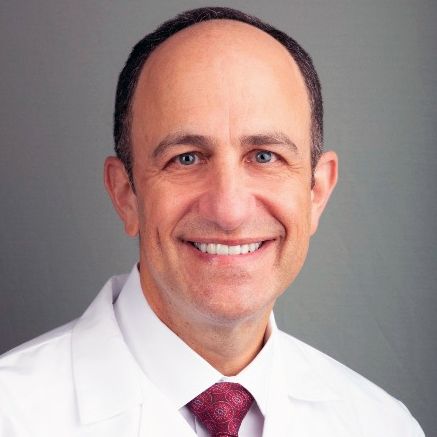Article
Induction Guselkumab Effective for Ulcerative Colitis Regardless of Prior Therapy
Author(s):
Treatment with guselkumab resulted in greater improvements across key clinical and endoscopic/histologic outcome measures at week 12 compared with placebo in patients with moderately to severely active ulcerative colitis with or without a history of inadequate response or intolerance to advanced therapy.
David T. Rubin, MD, FACG

Induction treatment with 12 weeks of guselkumab (Tremfya) elicited clinical remission, symptomatic remission, and endoscopic improvements compared with placebo for patients with moderately to severely active ulcerative colitis (UC) regardless of prior response to advanced therapies, such as TNF alpha antagonists, according to an analysis from the phase 2b QUASAR study presented at the American College of Gastroenterology (ACG) 2022 Annual Scientific Meeting in Charlotte, NC.
In the QUASAR induction study, in those specifically with an inadequate response or intolerance to advanced therapies, a clinical response was seen 54.3% of patients with the 200 mg dose of guselkumab, this was 47.1% with the 400 mg dose and 25.5% with placebo. In those with no history of inadequate response or intolerance, the clinical response rates were 29.6%, 67.3%, and 73.2% for the placebo, 200-mg, and 400-mg of the IL-23p19 subunit antagonist guselkumab doses, respectively.
"In patients with moderately to severely active UC with or without a history of inadequate response or intolerance to advanced therapy, treatment with guselkumab resulted in greater improvements across key clinical and endoscopic and histologic outcome measures at week 12 compared with placebo," lead author David T. Rubin, MD, FACG, University of Chicago Medicine Inflammatory Bowel Disease Center, Chicago, IL, said during a presentation of the results.
In the study, patients were randomized to receive placebo (n = 105) or intravenous guselkumab at either 200 mg (n = 101) or 400 mg (n = 107) on weeks 0, 4, and 8. Patient characteristics were balanced across arms, and 47.3% had a history of intolerance to advanced therapy. Those with inadequate response or intolerance to advanced therapy were numerically older (43.6 years and 39.8 years) and with a longer duration of UC (9.08 years and 6.17 years). Additionally, more patients had extraintestinal manifestations in those with an inadequate response (20.3% and 12.1%). Mayo score was between 5 and 9 at induction baseline.
The types of advanced therapies included anti-TNF only, vedolizumab only, tofacitinib only, or multiple types of agents together. Conventional therapies were being received by 86.5% to 93.9% of patients at baseline and consisted of oral corticosteroids, immunosuppressant drugs, and oral aminosalicylates.
In those with an inadequate response or intolerance to advanced therapies, the clinical remission rate was 17.4% and 17.6% with guselkumab at 200 mg and 400 mg, respectively, compared with 7.8% with placebo. Symptomatic remission was seen in 17.6%, 39.1%, and 37.3% of patients receiving the placebo, 200-mg, and 400-mg doses of guselkumab, respectively.
Endoscopic improvement in those with an inadequate response or intolerance was experienced by 9.8%, 23.9%, and 21.6% of patients in the placebo, 200-mg, and 400-mg arms, respectively. Histo-endoscopic mucosal improvement was experienced by 5.9% of those in the placebo group, 13.0% in the 200 mg arm, and 19.6% in the 400 mg guselkumab arm. Endoscopic normalization was 5.9%, 10.9%, and 5.9% for the placebo, 200 mg, and 400 mg arms, respectively.
For those with no history of inadequate response or intolerance, the clinical remission rate was 32.7% with 200-mg guselkumab and 32.1% with the 400 mg dose versus 11.1% with placebo. Symptomatic remission was experienced by 22.2%, 58.2%, and 57.1% of patients across the placebo, 200 mg, and 400 mg arms, respectively.
Endoscopic improvement in those with no prior exposure to advanced therapy was seen in 14.8% of those in the placebo group compared with 36.4% and 39.3% of those in the 200 mg and 400 mg guselkumab groups, respectively. Histo-endoscopic mucosal improvement was experienced by 11.1%, 27.3%, and 33.9% of patients in the placebo, 200 mg, and 400 mg arms, respectively. Endoscopic normalization was seen in 7.4% of those in the placebo group compared with 23.6% with 200-mg guselkumab and 21.4% of those treated with the 400 mg dose.
The oral abstract, “The Effect of Guselkumab Induction Therapy In Patients With Moderately To Severely Active Ulcerative Colitis: QUASAR Phase 2b Induction Results at Week 12 by Prior Inadequate Response or Intolerance to Advanced Therapy,” was presented at ACG 2022.




